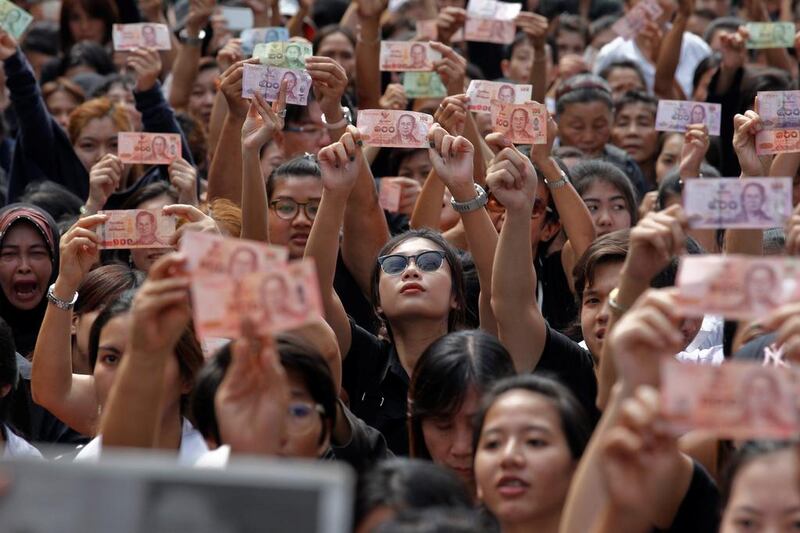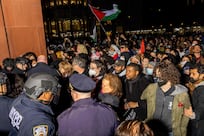Christopher Hart
Foreign Correspondent
BANGKOK // Dressed in the traditional Buddhist mourning colours of white and black, Thais came to honour and grieve for the only monarch most have ever known as his body was driven to the Grand Palace on Friday afternoon.
In their tens of thousands, pressed together cheek by jowl, they lined the route for the motorcade that carried the remains of King Bhumibol Adulyadej back across the Chao Praya river from the hospital that had been his home during his years of worsening health.
Many waited patiently and silently in the searing heat, often after setting off from their homes in the provinces the previous evening following the announcement of the death of the world’s longest-ruling monarch. President Sheikh Khalifa, Sheikh Mohammed bin Rashid, Vice-President and Ruler of Dubai and Sheikh Mohamed bin Zayed, Crown Prince of Abu Dhabi and Deputy Supreme Commander of the Armed Forces sent their condolences to the Thai royal family and Thai government.
As the convoy passed, the mourners knelt or sat, adopting the position of traditional Thai deference to royalty, and held their hands together in prayer, while sobs rippled through the crowds.
“We no longer have him,” wept Phongsri Chompoonuch, 77, as she clutched the late monarch’s portrait. “I don’t know whether I can accept that. I fear, because I don’t know what will come next.”
Bhumibol died on Wednesday, aged 88, after 70 years on the throne. He was widely revered as a unifying father figure during decades of rapid economic progress and coup-plagued political turbulence.
After the arrival of his body at the Temple of the Emerald Buddha in the palace compound, Crown Prince Maha Vajiralongkorn oversaw a bathing ceremony, the first stage of lengthy funeral rites that will include at least 100 days of chanting by monks and months more of palace rituals.
The previous evening, the 64-year-old prince was declared the king’s successor in an address to the nation by Gen Prayuth Chan-ocha, the prime minister and junta leader.
But then, in a move that surprised an already stunned nation, prince Vajiralongkorn said he would not take up the position immediately as he wanted time to grieve for his father.
His decision fuelled the anxiety felt by many Thais about the future of their military-ruled country.
Gen Prayuth assured the country that the prince would take the throne after “an appropriate time” but in the meantime Prem Tinsulanonda, the 96-year-old — but still sprightly and influential — head of the Privy Council and a former prime minister, was named as regent during the unexpected interregnum.
Prince Vajiralongkorn has spent most of recent years at his homes in Germany and does not command the same reverence and devotion as his father.
Detailed scrutiny of the monarchy is prevented inside Thailand by harsh lese-majesty laws. Insulting or criicisng the royal family is crime in Thailand, carrying long prison terms, and prosecutions have surged under the current military government.
Despite his training as an air force fighter pilot, the prince lacks his late father’s bond with the military. Nor does he have the late king’s experience as a power-broker between competing elites.
Gen Prayuth led a coup in 2014 after years of political turmoil and overthrew the democratically-elected government of Yingluck Shinawatra. The general’s regime has consolidated its power in the run-up to the expected succession. A new constitution, enshrining military influence in political life, was supposed to lay the ground for elections by late next year, but they may now be delayed.
It was the junta leader who spelled out the guidelines for the mourning period. For government agencies, this will last for a year, while the country was ordered to avoid “festivities” for 30 days.
The infamously louche all-night full moon party on the holiday island of Koh Phangan was cancelled, to the dismay of some revellers who lamented on social media that the gathering was the only reason they had travelled to Thailand. A concert by the British singer Morrissey next week was also cancelled. But the government is well aware of the economy’s heavy dependency on tourist dollars and did not order bars to close, only to stop serving by 1am and to avoid music blaring into the street.
Government offices and state-run enterprises were closed out on Friday, but commercial activity otherwise carried on.
Authorities continued to interrupt all television programming in the country — including international networks such as the BBC and CNN — using their signals to broadcast documentaries on the king’s life. and for 24 hours Thai television broadcast only in black and white.
The government said broadcasters could resume their own programming by the end of Friday, albeit with new mourning-period guidelines.
foreign.desk@thenational.ae
* With additional reporting from Agence France-Presse





